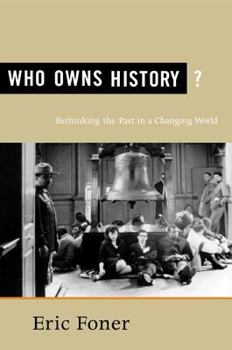Who Owns History?: Rethinking the Past in a Changing World
Select Format
Select Condition 
Book Overview
"Who Owns History? testifies to Eric Foner's lifelong personal commitment to writing histories that advance the struggle for racial equality and economic justice." --David Glassberg, The Sunday Star-Ledger
History has become a matter of public controversy, as Americans clash over such things as museum presentations, the flying of the Confederate flag, and reparations for slavery. So whose history is being written? Who owns it? Eric Foner answers these and other questions about the historian's relationship to the world of the past and future in this provocative, even controversial, study of the reasons we care about history--or should.Format:Paperback
Language:English
ISBN:0809097052
ISBN13:9780809097050
Release Date:April 2003
Publisher:Hill & Wang
Length:256 Pages
Weight:0.92 lbs.
Dimensions:0.9" x 5.4" x 8.4"
Customer Reviews
5 ratings
The title is misleading
Published by Matt Nelson , 3 years ago
I was hoping for more discussion on interpretations of history however, it was more about his mentor. It really lacked substance for me. I thought there would be more about some of the controversies in the last 30 years of historians that could have helped me in writing my book.
Good Book
Published by Thriftbooks.com User , 18 years ago
The book from Eric Foner was used in my Historical Methods class. I really enjoyed reading it. It was a good read and make me think. The book was a well - written book giving his views on racial differences and how they are handled in our society.
A gritty and compelling set of essays
Published by Thriftbooks.com User , 23 years ago
Foner is not one to beat around the bush. He tackles pressing social and political issues head on. In this remarkable collection of essays, he has taken aim at several key issues which define contemporary society. The most compelling essay is probably "Blacks and the U.S. Constitution," in which he examines the motivations behind the conservative desire to read the Constitution in terms of its "original intent."As Foner notes, this is more a political than a historical argument. By narrowing the interpretation of the Constitution to its "original intent," conservatives hope to avoid addressing the more thorny issues which the later amendments attempt to address. He views the current decisions by the Supreme Court as part of an overall drive toward "Redemption," similar to the period of readjustment, in which states nullified much of the Civil Rights legislation which was enacted by the Radical Republicans during Reconstruction. This eventually led to the notorious era of Jim Crow.Foner views history as a continuum, not a set of isolated events, which can be referred to to bolster one's political arguments, whether they be conservative or liberal. Like his mentor, Richard Hofstadter, Foner rebels against consensus opinion, asking readers to form minds of their own. The essays are gritty and compelling and serve as a reminder of the intellectual prowess of one of the foremost historians of our time.
Examines the historian's relationship to past and future
Published by Thriftbooks.com User , 23 years ago
How we document and memorialize the past receives attention in a survey that questions the nature of historical scholarship in modern times. This considers the processes and nature of historical scholarship, using addresses and essays to examine the historian's relationship to past and future events.
A view of the relationship between history and historian
Published by Thriftbooks.com User , 23 years ago
What constitutes history and how it should be told has become an increasingly significant question over the years. How events are portrayed in history texts often is more the result of the social climate at the time or the purpose of the writer than actual fact. Part of the problem with history is that as new facts are discovered and new perspectives proposed history is rewritten. Different groups offer a different perspective to the traditional perspective. So, we now have black history, women's history, etc. However, these same historians must deal with a fickle public whose primary interest in history has traditionally been that it be told with a particular purpose in mind. When the Constitution states that everyone has a right to life, liberty and the pursuit of happiness we are taught that it means literally everyone. However, history has at times excluded American Indians, Black Americans and others. Particular areas of the United States have excluded the Irish, the Catholic, the Polish, the Japanese or any number of other groups.This book contains nine essays by Eric Foner, a professor of history at Columbia University, that were prepared for various conferences and book introductions. In these essays Foner examines how the historian interacts with the history and their surroundings and how that interaction determines their perspective on history. It includes essay on Mr. Foner's personal life as a historian and the things that influence his perspective. Others include essays on modern Russia and post-apartheid South Africa and how they are rethinking their past in view of the current changes. Probably the most interesting essays are in Mr. Foner's area of specialization - slavery, the Civil War and post-Reconstruction America. An especially interesting read for those who are not familiar with the controversies of traditional history, it is a good read, logically argued and recommended for early college level students or higher. For most of the essays the writing is slightly above the level of the average high school student.






